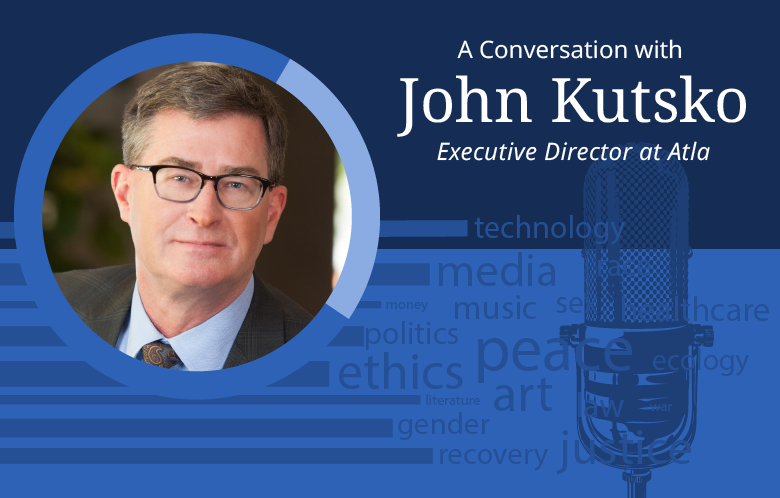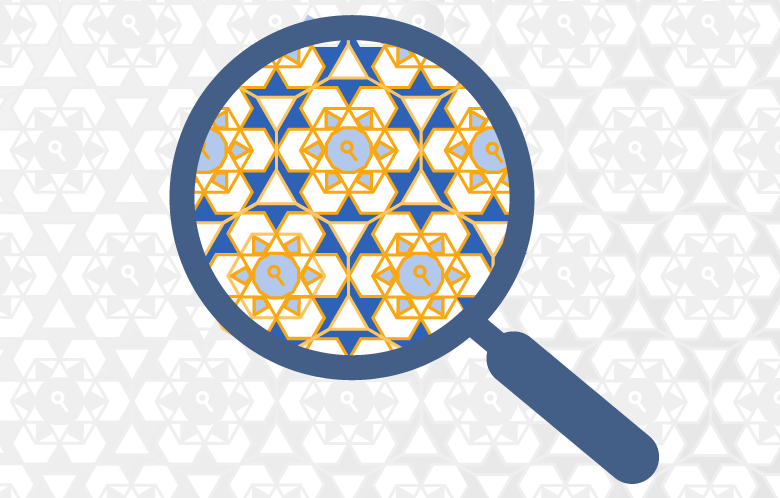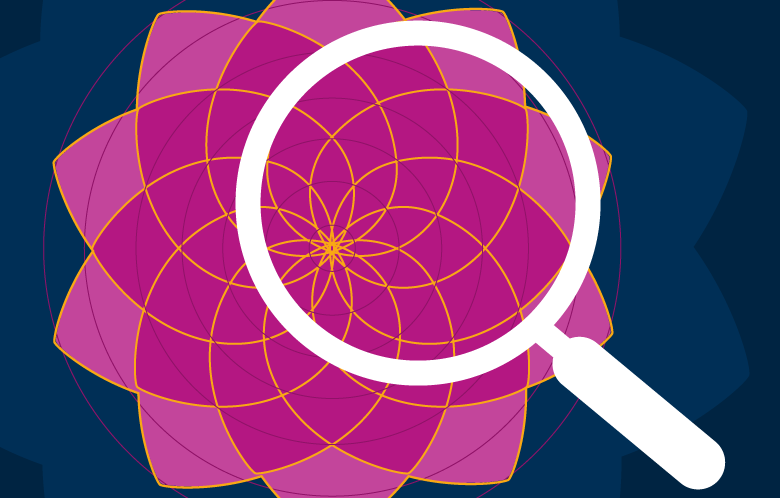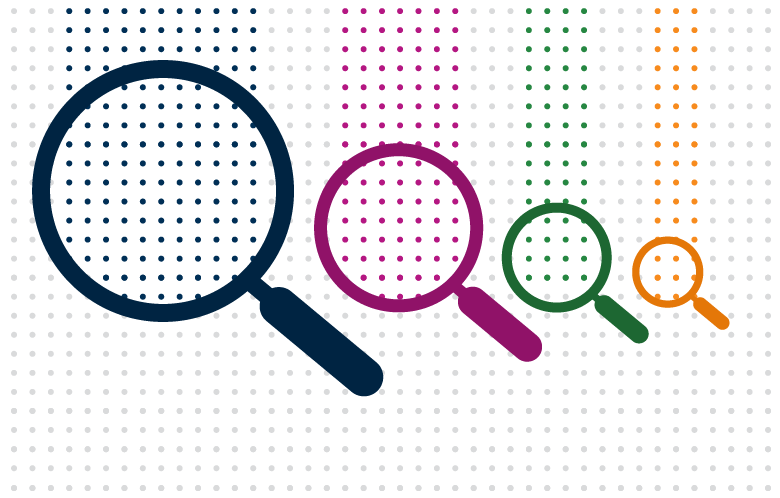In a world where being religiously and theologically informed is the key to understanding diverse cultures, perspectives, and global dynamics, Atla stands at the forefront.
We recently had the privilege of sitting down with Atla's Executive Director, John Kutsko, who assumed the position in late December 2022. The interview delves into the motivations that led him to this role, highlighting the unique position Atla occupies in the realm of the study of religion and theology. As a religion scholar who has utilized Atla's research tools since the 1980s, John shares a profound connection with the organization. Atla's adaptability to the evolving landscape of humanities and theological education, coupled with its commitment to inclusivity, makes it a powerhouse for students, scholars and librarians alike.
Join us as we unravel the journey that brought John to Atla and discover the organization's pivotal role in shaping the future of not only religious studies, but that of the humanities and social sciences.
You assumed the position of Executive Director at Atla in late December 2022. What brought you to Atla?
So many things brought me to Atla.
As a religion scholar, I have used Atla’s research tools since the 1980s. They are the most important thing you need to research and teach. So, wow, I get to be part of this?
The challenges humanities and theological education are facing, including shrinking library budgets, play to Atla’s strengths. Atla is always adapting to faculty and student needs. Subscribing to Alta databases means you have a team constantly responding to new areas of study around the world, staying ahead of the research that libraries need. Atla is a library’s best return on investment.
Also, in a world in which religion is everywhere, Atla has something for every discipline in the humanities and social sciences, even in professions like healthcare, law and public policy. Everyone, every profession, needs to be religiously and theologically informed in a global interfaith world.
So, as you can see, this is an exciting organization to join.
Atla is both a theological library association and a producer of the premier databases for the study of religion and theology. How do these two pieces fit together?
Our databases are unique because we’re also a library association, specializing in religion and theology producing the premier databases for studying religion and theology. Atla produces the research tools that it knows librarians need because librarians are its members. The two parts are a whole, and they mutually serve one another in order to serve students and scholars.
No other library association in humanities or social sciences puts a tool like this into the librarians’ hands and under their control.
Why is that important? Librarians have a wider perspective than students or scholars. They see the big picture. What are the emerging or currently inaccessible areas of interest a library needs to support? As courses and curricula change and as scholars expand their areas of interest, the databases adapt because they are librarian-driven. So, Atla doesn’t just provide a database for the faculty and students, it empowers religion and theological librarians with tools to respond to the future of theological education. We do that by decolonizing collections, broadening their religious scope, incorporating emerging scholarship, including new research methods, adding marginalized voices and integrating interfaith sense and sensibility.
The Atla products, such as the Religion Index One, have evolved and transformed a lot over the years, from printed volumes to CDs. Today, Atla produces Atla Religion Database®, AtlaSerials® and Atlas PLUS®. How are these tools being used today – and by whom?
It is the go-to resource for scholars and students to do research. Undergrads use it, my daughter used it in college when she studied religion and social work. For graduate students and those pursuing a Master of Divinity or a PhD, it is a lifeline. You can’t write a dissertation or thesis without it. For faculty engaged in research, it is a life-long resource. And Alumni and ministers, after graduation, rely on the database for teaching and preaching.
But that has always been the case. What has changed is the scope and breadth of the databases. Both the content and the audience are global, interdisciplinary and multi-faith. That means it covers all religions, from both a historical perspective and as living and breathing traditions.
And because the databases include journals from around the world, it becomes a democratizing, equalizing force for research so that scholars, for example, in the US, understand research interests in Korea or South Africa. The database broadens everyone’s perspective.
How does Atla ensure that the content within its products is diverse and inclusive, global, interdisciplinary and multireligious?
Two ways. First is our commitment to creating a diverse, global and interdisciplinary database. This is driven by the values of the library association, which understands the needs of scholars and students.
The second is our staff that license content from publishers and create the metadata from the content. Our licensing team and metadata analysts are subject area specialists with advanced degrees in religion and theology and with multilingual expertise in both ancient and modern languages.
That intention and commitment means we have grown our editorial staff to cover the full range of world religions and indigenous traditions, as well as the interdisciplinary methods needed to research them. Our staff has the expertise to review research published in other countries that reflect a diversity of theological, religious, political and philosophical perspectives. We are keenly aware of the trends in the humanities and social sciences.
We also continually evaluate the language we use to describe the research, so it is inclusive and free from bias. In other words, what we include, and how we describe it, reflects an inclusive commitment and our core values.
What is your vision for the future of Atla?
To advocate for the central role that librarians play in theological education, scholarly research, religious literacy and interfaith understanding. Librarians have a wide-angle lens and understand what students and scholars need. Because of this, I think Atla can influence the study of religion in universities so that it is integrated into all the disciplines that make up the humanities and social sciences. Even bolder, Atla can provide resources for professional studies because religion is critical to understanding the human condition. How can doctors, nurses and chaplains integrate the religious dimension of patient care? How does law account for deeply held convictions and differences in our religiously diverse communities? How do policymakers and peacemakers understand the ways in which religion is a driving factor in our multi-faith world?
Here's a graphic that tells this story, this indisputable fact: Religion is everywhere. Let Atla be your guide.
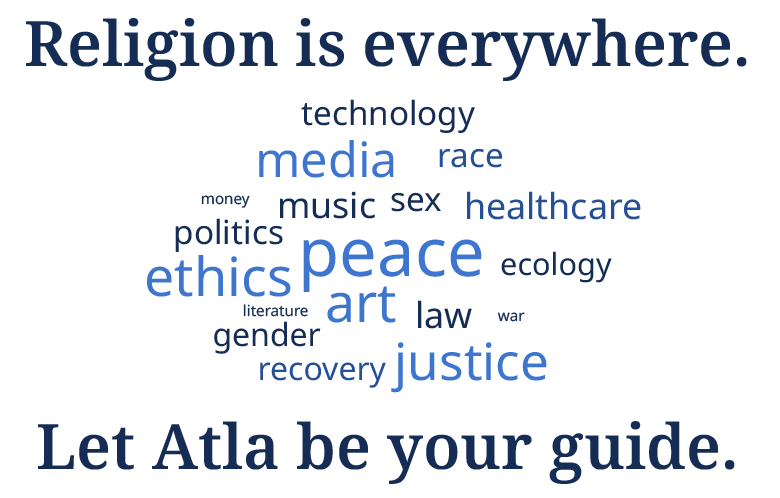
Wherever and however people study religion, Atla has the tools you need.
I am convinced of three things. First, theological librarians are more critical than ever in the changing environment for religious studies and theological education. Second, Atla’s products are more critical than ever in an age of un-curated information. Third, the study of religion is critical to peace and mutual understanding. Religion is the litmus test for civil discourse, community, and empathy. In theological librarianship, religious literacy fosters understanding and respect. Atla serves professions and professionals who need to be religiously and theologically informed in a global interfaith world. Atla can help you understand your neighbor and the world.
As you approach the milestone of your one-year tenure as Atla's Executive Director, are there any lessons you’ve learned that you would like to share?
During the last 10 months visiting with Atla members, I have seen how critical it is for information literacy to be taught and internalized in the study of religion and theology. Religion is too important, too consequential, to be left to a Google search. It needs resources that are curated and trusted. If information literacy is not taught and practiced, the results have consequences. In a seminary and divinity school, every incoming class produces outgoing pastors, community organizers and chaplains. In a college or university, the incoming student becomes an outgoing doctor, nurse, politician, social worker, journalist, police officer, a soldier. In every case, they are a neighbor and a citizen. I’ve heard a librarian ask the question, “If it doesn’t happen here, what will happen there?” A curated database with work that has been selected because of its reliability is critical in this time of mis- and disinformation. As generative AI expands, we want it to feed on good stuff, not bad.
Second, Atla’s databases, led by a library association, are in the best position to adapt. As education becomes more nimble and responsive to economic and global challenges, and as humanities, social sciences, and theological education become more problem-focused, educators will desperately need librarians to help them adapt, do research outside their comfort zones, rethink their teaching and ensure their students can find answers to their questions online and off the shelf.
Religion is everywhere, and Atla is your guide.
